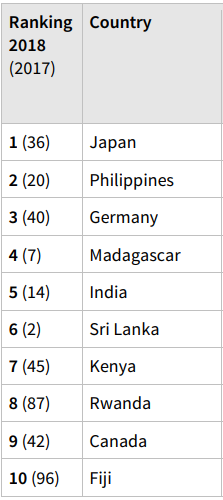Global Climate Risk Index 2020 | 05 Dec 2019
Why in News
The international environmental think tank ‘Germanwatch’ has recently released the Global Climate Risk Index 2019.
- The index analyses the extent to which countries and regions have been affected by the impacts of weather-related loss events (storms, floods, heat waves etc.).
Key Findings
- Worst affected in 2018: Japan, Philippines and Germany
- Worst affected between 1999-2018 (long-term index): Puerto Rico, Myanmar and Haiti
- Deaths and financial loss between 1999-2018: Altogether, about 5 lakh people died as a direct result of more than 12 000 extreme weather events globally. Losses amounted to around US$ 3.54 trillion (in purchasing power parities).
- Poor countries had to face much higher impacts: Of the ten most affected countries and territories in the period 1999-2018, seven were developing countries in the low income or lower-middle income country group, two were classified as upper-middle income countries (Thailand and Dominica) and one was an advanced economy generating high income (Puerto Rico).
- Link between climate change and the frequency & severity of extreme heat: Heatwaves were one major cause of damage in 2018.
- Of the ten most affected countries in 2018, Germany, Japan and India were suffering from extended periods of heat.
- Across Europe, extreme heat spells are now up to 100 times more likely than a century ago.
- Impact of heatwaves on African countries may be under-represented due to a lack of data.
India
- India, which suffered water shortages, crop failures and worst flooding, holds the 5th position. It has fallen from its 14th rank of countries hit most by climate change-induced weather phenomena in 2017.
- India has also recorded the highest number of fatalities due to climate change and the second-highest monetary losses from its impact in 2018.
Suggestions
- The 2019 Climate Summit in Madrid needs to address the lack of additional climate finance to help the poorest people and countries to address loss and damage.
- These countries are more vulnerable to the damaging effects of a hazard but have lower coping capacity.
- The climate summit needs to result in:
- a decision on how the need for support for vulnerable countries concerning future loss and damage is to be determined on an ongoing basis
- the necessary steps to generate and make available financial resources to meet these needs
- strengthening the implementation of measures for adapting to climate change
Germanwatch
Germanwatch, based in Bonn and Berlin (Germany), is an independent development and environmental organisation which works for sustainable global development.
